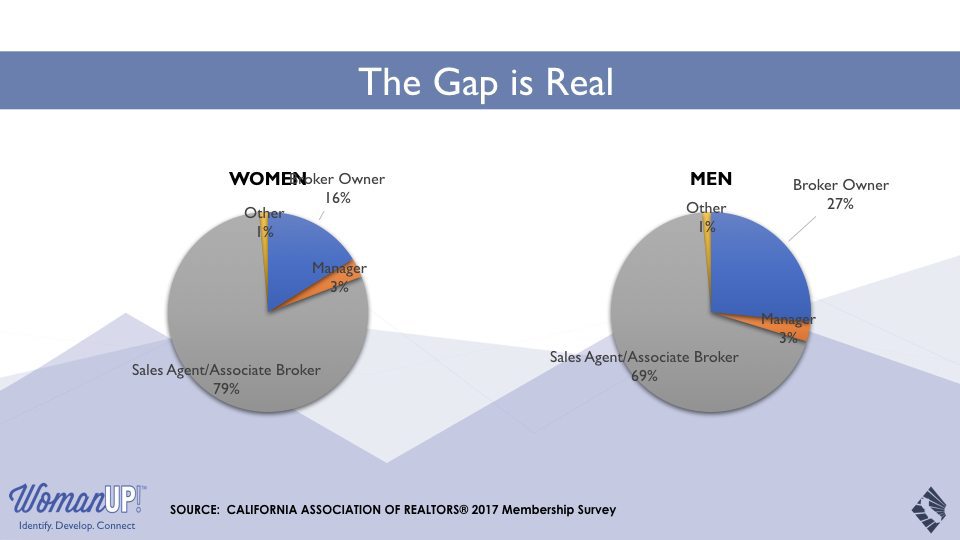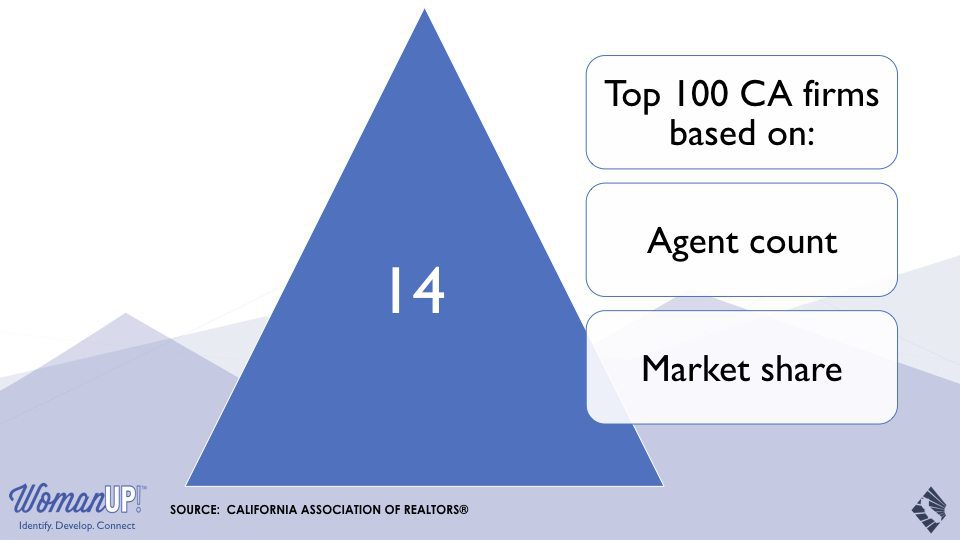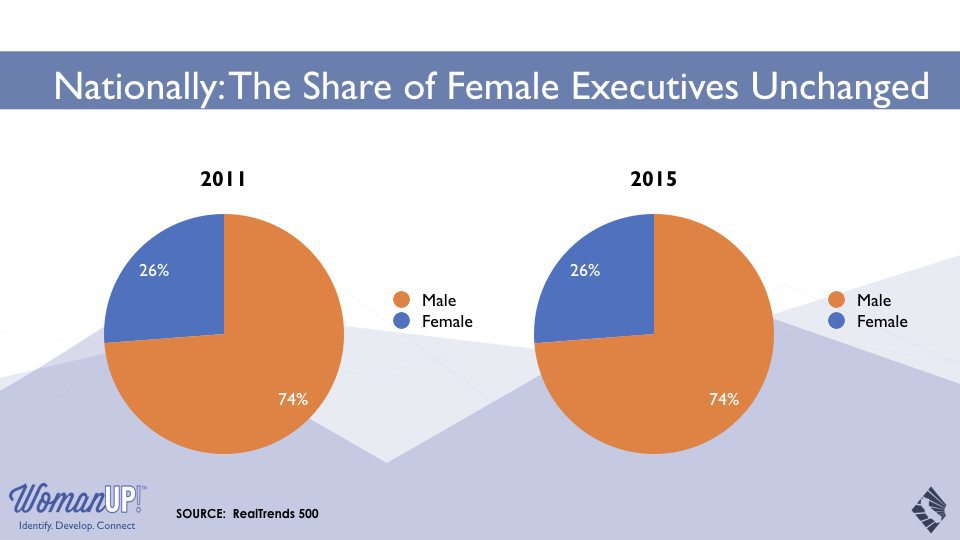- Of the respondents to the C.A.R member survey, 16 percent of women were broker-owners compared with 27 percent of men.
- C.A.R.'s Women's Initiative is using events, research, mentoring and other resources to help close that gap.
Why are men more likely to be broker-owners than women? And why do more women opt to form their own independently owned brokerages instead of pursuing a more corporate career path?
These are questions that researchers at the California Association of Realtors (C.A.R.) have been exploring (and discovering) through the C.A.R. Women’s Initiative, which intends to “create a community where mentors and leaders can communicate, collaborate, advocate for, and support one another,” according to the initiative’s website.
C.A.R. Vice President Sara Sutachan and Senior Vice President and Chief Economist Leslie Appleton-Young took the stage at Inman Connect San Francisco (ICSF) to talk about the Women’s Initiative and the WomanUP! event that C.A.R. hosted in June, and to present preliminary findings from the initiative’s report — “How women brokers are reinventing the rules of leadership in the 21st century.”
Appleton-Young and Sutachan then sat down with Inman for an in-depth discussion on the current state of women in the real estate industry.
Mind the gap!
“It wasn’t a surprise,” Sutachan explained, “but when you look at the universe of women in our membership, that 16 percent number was very shocking — it was very low.”
 She’s referring to the gap between women who are broker-owners in the real estate industry and men who claim the broker-owner title. About 27 percent of male respondents to C.A.R.’s annual membership survey called themselves broker-owners, compared to 16 percent of female respondents.
She’s referring to the gap between women who are broker-owners in the real estate industry and men who claim the broker-owner title. About 27 percent of male respondents to C.A.R.’s annual membership survey called themselves broker-owners, compared to 16 percent of female respondents.
They also found that the people running the top real estate firms in California are predominantly men. Of the top 100 California real estate firms (based on agent count and market share), only 14 are helmed by women.
“The data part of this was critical,” noted Appleton-Young, “because we wanted to really home in on broker-owners and talk about getting people to the next level.”
The research report included data from the C.A.R. annual member survey as well as from the National Association of Realtors, the California Bureau of Real Estate and Inman’s special report on women in real estate leadership. Sutachan added that they also conducted in-depth interviews with 25 female broker-owners who could speak to the challenges and opportunities available to them on their leadership journeys.
Carving a path vs. following the herd
Appleton-Young and Sutachan both mentioned a trend that they want to explore further in the future: Women broker-owners tend to want to run a different kind of firm.
“What we do know from our meetings and the makeup of our industry is that women tend to run smaller, independent firms, and men are at the helms of the large corporate or franchised firms,” Sutachan said.
And Appleton-Young noted that there’s always a spectrum of responses within any group. “The diversity of responses of the women themselves to this initiative has been interesting,” she explained. “Some of them are like, ‘Don’t worry about getting us a seat at their table — we’re going to build our own.’ And others are saying, ‘Speak truth to power, invest your power in real estate and look at where the money and the power are consolidated.'”
Why adding women to leadership teams is better for business
A growing body of research is indicating that there are distinct advantages to promoting women to leadership positions; and moving forward, those could become severe disadvantages to companies that aren’t paying attention to the gender balance of their leadership teams.
The reason? Women seem to have more skill for social sensitivity than men do.
As the need to navigate economic and social trends becomes increasingly important to businesses, they’ll need socially sensitive people in positions of power to ask the right questions and steer the ship in the appropriate direction.
This extends to inviting women on stage at real estate industry events to speak. The C.A.R. Women’s Initiative is building a women’s speaker bureau, Appleton-Young told Inman, “so when someone says, ‘We couldn’t find a qualified woman on this topic,’ we can say, ‘Next time, check out this resource.'”
How the C.A.R. Women’s Initiative is moving the needle
The brokerage industry, Sutachan said, is “our niche, and that’s where we believe we can move the needle.”
So the idea is to encourage more women to take the leap from real estate agent or broker associate to broker-owner.
To do that, they’re leveraging “a network and community of support and collaboration for women and men,” Sutachan explained, including a mentoring network.
“That’s a key component,” she added. “Mentoring from the top for leadership positions is key.”
And they hope to also continue to leverage events like the WomanUP! conference to help show women that they don’t need to wait to be invited to promote themselves to broker-owner — they can take the initiative themselves.
“We want to provide tools; we want to provide professional development and role models for that,” Sutachan said. “I had women coming up to me after the conference saying, ‘This was so timely; you’ve changed my life and my outlook.'”
She added that an ICSF attendee told her that she’d applied for her broker’s license after attending WomanUP! “It gives me chills,” Sutachan added. “It was really needed.”
“In large part, our industry is very female-friendly because on the agent side, you can be a top producer — you just have to work hard and do it,” Appleton-Young noted. “The caveat to that is if you go to any major city and look at the top 10 top producers in the luxury market, it will be heavily weighted toward men.”
But that said, she thinks that comparatively speaking, the real estate industry is in decent shape. “A lot of men in the real estate industry have the benefit of dealing with very successful, motivated, educated women,” Appleton-Young said. “We have a head start compared to industries like tech.”
“Awareness is the key word here,” Sutachan added. “We are just raising the awareness.”















